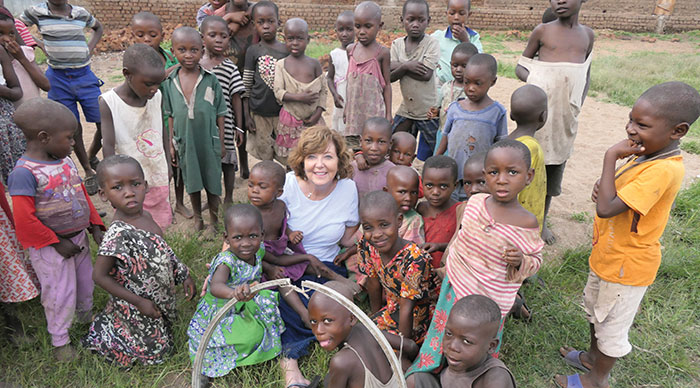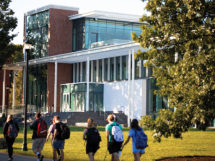
Editor’s note: Supplies Over Seas unveiled a new look and name change Oct. 17 for the first time in the organization’s 25 year history.
Since 1993, one Louisville-based organization has been working to improve health outcomes not just in Kentucky but around the globe by putting a dent in the nearly 6 million tons of medical surplus generated by hospitals yearly.
Founded by the late Dr. Norton Waterman, Supplies Over Seas began as a program under the Greater Louisville Medical Society to save surplus medical equipment and supplies at hospitals, clinician offices and elsewhere from going into landfills and instead delivering them to medically impoverished areas. SOS has reached 105 countries around the globe in addition to spearheading efforts across Kentucky and the United States.
As one of only 15 accredited Medical Surplus Recovery Organizations (MSRO) in the United States, SOS has over 180 hospitals and physicians offices that support and provide supplies throughout the country, including in Birmingham, Nashville, Cincinnati, Southern Indiana and across the commonwealth. Some of SOS’s Kentucky partners include Norton Healthcare, Baptist Health, Owensboro Health Regional Hospital, Twin Lakes Regional Medical Center and Hardin Memorial.
Though each donor and partner receives a tax deduction relative to its tax bracket, SOS President and CEO Denise Sears believes much of the motivation for those who donate is to contribute to the betterment of society and a positive social outcome.
An explosion of SOS partnerships nationwide and worldwide can be attributed to it having become a 501(c)3 nonprofit in 2010, combined with Sears – who came in 2016 – bringing her background in banking from Manufacturers Hanover, investment management from Saratoga Investment, and sales and marketing from running her own consulting company.
- IT’S FREE | Sign up for The Lane Report email business newsletter. Receive breaking Kentucky business news and updates daily. Click here to sign up
SOS has expanded its full-time staff from two to eight and schedules 17,000-20,000 volunteer hours yearly. Its shipping output has increased from 90,000-160,000 pounds of supplies per year to nearly 400,000 pounds.
“It’s very important for nonprofits to realize that they need to operate like a business,” Sears said. “SOS operates like a business even though we have a different reason for why we exist than a for-profit organization. At the end of the day, the way we operate needs to be as efficient and transparent as any of our friends in the corporate world.”
The organization has developed an extensive donation program for expired supplies that has doubled locally in the past 12 months according to Sears. Contributing to SOS’s mission of using or recycling 95% of the items it receives, donations are given to local nursing schools for educational purposes; this in turn combats educational cost-cutting and lessens the need for tuition hikes and other counteractive measures.
The variety of donated supplies helps those entering the field to gain experience and knowledge working with a broad spectrum of equipment from several manufacturers.
“No matter where they go to work, they’re likely to be familiar with whatever equipment that hospital uses, making them a better clinician and someone who can be more productive right away with a shorter learning curve,” Sears said.
SOS is shifting from being a Medical Surplus Recovery Organization (MSRO) to a world health organization since Sears came aboard, bringing with her a more holistic approach to measuring success. While in the past SOS determined success by the volume of supplies it distributed, under Sears the measure is based on the impact of creating sustainable movements and not just short-term fixes. An example is looking at environmental factors, which, according to the World Health Organization, are attributed to 12.6 million deaths per year.
“If we are sending medical supplies to a community in Ghana, Ecuador or somewhere without access to safe water, then we are merely putting a Band-Aid on the problem,” Sears said. “All we’d be doing is getting people healthy enough to re-enter their communities and get sick again.”
The difference, Sears said, is asking a few more questions and working together with other nonprofit partners to broaden assessments and make sure supplies sent out are appropriate for the health needs of the recipients. SOS used this approach when it sent supplies to Europe during the 2017 refugee crisis and more recently to Houston and Puerto Rico following Hurricanes Harvey and Maria.
The organization built on those lessons when sending aid this year to the Bahamas following Hurricane Dorian. After following weather reports ahead of the storm’s landfall and determining that the Bahamas would be its area of focus, Sears reached out to representatives at UPS about transporting supplies to a hospital in the Bahamas.
When a CNN report cited the most needed medical items in recovery efforts being hospital beds, walkers and wheelchairs, Sears realized SOS had all of those items in droves. She got them sent out in mid-September to Nassau and then their final destination of Grand Bahama.
“I’ve been to some of these areas and witnessed people who’ve lost children because they didn’t have access to safe child delivery or their child contracted an infection because they didn’t have anesthetics or protective gauze for a cut,” Sears said. “It really hits home, and the fact that I’m also a mother who’s lost a child has made this mission a very personal one for me.”
Further extending its commitment to advancing health in the developing world to help save lives, SOS is working to launch a pilot program in rural Uganda in the coming months that will provide focused medical care for women and children along with education for new mothers. The goal of that clinic, Sears said, is to curb the fatality rate of mothers and newborns in Africa, which currently is one death every 11 seconds. Additionally, Sears sees the clinic as another way for SOS’s partners and donors to see the real-world impact of their contributions.
For more information visit SuppliesOverSeas.org.
Matt Wickstrom is a correspondent for The Lane Report. He can be reached at [email protected].




















Add Comment